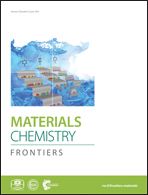Intrinsic quantum efficiency enhancement in well-known Ir(iii) complexes by virtue of a simple and controllable deuteriation strategy†
Abstract
A series of well-known iridium(III) complex molecular materials are selected for a comprehensive theoretical investigation into their complete or partial ligand deuteriation products. These compounds, respectively, are two homoleptic compounds fac-Ir(ppy)3 [ppy = 2-phenylpyridinate] (1) and fac-Ir(dfppy)3 [dfppy = 2-(2′,4′-difluorophenyl)pyridyl] (2), and two heteroleptic compounds Ir(ppy)2acac [acac = acetylacetonate] (3) and Ir(dfpypy)2pic [dfpypy = 2′,4′-difluoro-2,3′-bipyridinato-N,C4′, pic = picolinate] (4). Unlike traditional strategies for enhancing the radiative decay process or reducing the non-radiative decay process through cumbersome ligand decorations, our simple and controllable deuteriation strategy, which is insensitive to the radiative decay process, enables us to suppress the non-radiative decay process by almost 50%. It is consistent with previous experimental findings, under our theoretical evaluation, that deuterium has a significant influence on non-radiative deactivation processes due to the reduction in the amplitude and frequency of vibrational modes caused by the increased deuterium mass. The systematic computational approach for the evaluation of the non-radiative decay processes provides us with alterations of every single vibrational mode, from the primitive complexes to the completely or partially deuterated ligand complexes, in detail. The two-averaged modes assessment informs us that deuteriation exerts its main influence on the high-frequency modes, rather than the low-frequency modes. Additionally, partial ligand deuteriation has a correlation with the nature of the electronically excited state decay pathways.



 Please wait while we load your content...
Please wait while we load your content...